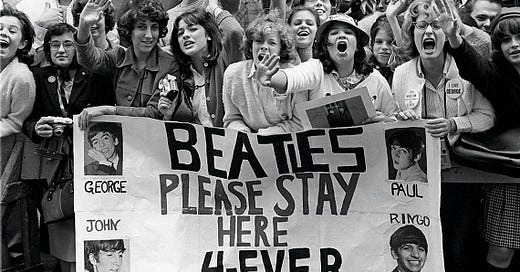When I was 13, I bought a sitar. I shipped it from India, found an instructor, and practiced ragas until my fingers bled as my instructor sipped his chai. I did this because George Harrison did it, and he wrote Love You To, and I was obsessed with it. I did this against the earnest wishes of my parents and adult friends who thought this was a phase. Beatlemania is not a phase.
My Beatles have changed since then. Your Beatles have changed since then. Most of us start on the same plane: a few months into our earliest memory-forming consciousness, we download the Beatles Basics as if they were U2’s Songs of Innocence just showing up one day: Hey Jude, Here Comes the Sun, Let It Be, Yellow Submarine (always the kiddie favorite, including my niece’s, and of course this was always going to be a Ringo tune), Twist and Shout. Nobody younger than 65 remembers hearing any of these songs for the first time. You learn to walk, you learn to speak, and you learn “naaaaaaaaah-nah-nah-NAHNAHNAH-NAAAAAH".
When you’re growing up, you’re told that the Beatles are the best band ever. You’re told that they changed music like nobody has since Beethoven. But you don’t really know what to do with these claims, how to evaluate them. In that given moment, you probably like other bands more than the Beatles.
But then you go through your first heartbreak, and suddenly “Yesterday” means something to you. Or you learn rhythm, and you realize how underrated-ly innovative Ringo’s drumming on “Ticket to Ride” and “In My Life” is. Or you see that Paul McCartney is working on songs with Rihanna and Kanye and you scratch your head when you realize that 1/4 of the Fab Four is still, 60 years later, pushing out new tunes with the largest names in music.
At some point, sooner or later, your Beatles obtain a higher dimension than the plane you started on.
My teenage self was caught between two passions: religion and music. I united these for a time as a guitarist in a worship band. But whereas there was a type of yin & yang harmony between the opposite poles of Christianity and, say, punk - you quickly give up on trying to mesh the eschatology of the New Testament with that of a sneering Sid Vicious wearing a literal swastika - the Beatles were a different story. They were good and I felt that in my soul.
Good, but godless. I didn’t know how to square my 15-year-old zealotry with John’s “We’re more popular than Jesus now,” or “Imagine no religion,” or “I don’t believe in Jesus” (okay, seems like John was the real problem). Then there’s the more subtle stuff, the psychedelic visions and transcendental meditation and George saying “I’ll make love to you” to anybody who would listen — all of which terrified and fascinated me. Paul, who seemed the most likely churchgoer, apparently has walked through life blissfully unaware of religion, saying stuff like “Jesus I could see, that’s a historical character.” And Ringo… I mean if your vision of the afterlife doesn’t include the original voice of Thomas the Tank Engine, you can go to hell.
I see now the reason for this tension: the Beatles are a religion in themselves, the most successful since Scientology, and way cheaper at that.1 They are the tragicomic story of four pagan gods and their many incarnations, their muses, their written teachings, and their gifts to humanity grand enough to make Prometheus blush. They are in many ways an improvement on traditional religion because you know they are human, so disappointment is built into the experience. They don’t promise a messiah - you know they’re never doing a reunion tour. They don’t claim omnipotence or benevolence, but they deliver something divine, a way to navigate every season of life with full feeling and color.
In the past few months, I’ve dived deeper into the world the Beatles created: within me and without me. I’m obsessed, and I want to share what I’ve learned. This is the first time I’ve ever written about them, but I hope I’ll never stop.
Posts (to come) - if you want to read these, please subscribe below!
Meet the Beatles
Modern men and the Beatles
The music: the most interesting women of the 60s
The music: psychedelia
The music: kiddie songs
The music: in the end
The scenes: my totally subjective ranking of the best screen appearances
The superlatives
John and Paul
Why Paul is the best Beatle
Paul is dead: the best of Beatles conspiracy theories
Why it’s getting better all the time
John and George, RIP, would hate for Beatlemania to become a religion — but then again, would Jesus be absolutely thrilled with what the Church has become? How confident are we?





